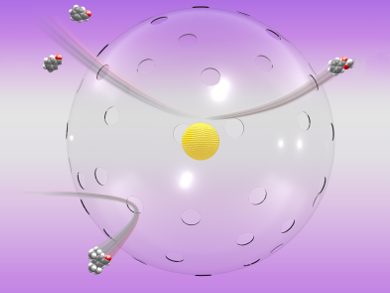Hybrid structures composed of nanosized components encapsulated in matrix materials have drawn considerable attention in the past few years. One particularly promising type of these nanostructures known under different names, yolk-shell, core@shell, nanorattle, or ship-in-a-bottle nanoreactors (NRs), consists of metal nanoparticles (NPs) confined within shells or voids of organic or inorganic material.
To date, many different reactions have been catalyzed by NRs, including reductions, oxidations, and halogenation. However, for the vast majority of reported NRs, size selectivity remains a challenge and is often achieved at the expense of the diffusion rate or the conversion of substrates due to the thickness of the shells.
Eugene Pinkhassik and collaegues, University of Connecticut, Mansfield, USA, have tackled this problem by constructing yolk-shell nanoreactors with metal nanoparticle cores (Au and Pt) and ultrathin porous polymer shells. These single-nanometer porous polymer shells were prepared by vesicle-templated directed assembly and provide size selectivity and improved reusability of the catalyst. The newly formed NRs were then utilized in the oxidation of benzyl alcohol and benzaldehyde (Au NRs) and hydrogenation of cyclohexene (Pt NRs).
Comparison of the NRs with commercially available nanoparticles revealed superior reusability and size selectivity in the NRs without a compromise on the reaction kinetics. Considering the straightforward control of size and chemical environment of the nanopores in these NRs, it is anticipated that these materials will be expanded to different types of catalysts and catalytic processes.
- Size-Selective Yolk-Shell Nanoreactors with Nanometer-Thin Porous Polymer Shells,
Ying Jia, Sergey N. Shmakov, Paul Register, Eugene Pinkhassik,
Chem. Eur. J. 2015.
DOI: 10.1002/chem.201501968




